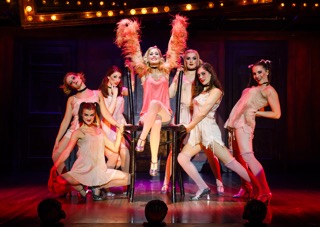A night at the “Cabaret:” Broadway show comes to State Farm Center
May 1, 2018
Saturday night, community members shuffled into the State Farm Center to watch the musical, “Cabaret.” Old friends greeted each other, catching up as musical theater fans donned their Broadway shirts, eagerly searching for their seats.
The chatter was silenced as the lights dimmed, signaling the show was about to begin. The master of ceremonies, the “Emcee” — played by Erik Schneider — dressed in a metallic coat and white makeup, appeared on stage. Breaking the fourth wall, he welcomed the audience to the show and to the beautiful city Berlin, insisting all troubles be forgotten for the evening.
In the grandiose and almost circus-like opening number, “Wilkommen,” the Emcee introduced the cabaret girls and boys of the Kit Kat Klub, each impoverished yet intoxicated with the party culture of Berlin.
Complete with a striptease from the Emcee himself, “Wilkommen” set the tone for the sexually-charged show that both challenged the social norms of the time and captured the chaos of the Nazi party’s rise to power in Germany.
“Cabaret” first opened on Broadway in 1966 and won the Tony Award for “Best Musical” the subsequent year. It has been revived and toured several times in theaters around the world, also receiving nominations and winning accolades from the international theater community.
Get The Daily Illini in your inbox!
Yahli Barken, Champaign Central High School student, attributes the timelessness of the show to the music and the atmosphere it creates, specifically for the character Sally Bowles, played by Bailey McCall Thomas, a British cabaret singer at the Kit Kat Klub.
“It’s music you can listen to, and it’s kind of like Hamilton because it tells the entire story through the music. Like, it goes through the emotional roller coaster that Sally goes through. She’s like, ‘I have this great job,’ ‘I don’t have a job,’ ‘Oh no, I’m having a baby…without a job,’ ‘My boyfriend is smuggling things for Nazis’. That’s how she conveys everything — through song and not talking,” Barken said.
Community member Tabatha Rice attributes the timelessness of the show to its relevance of the current polarized political climate.
“The political aspects are very controversial and relate to the present time,” Rice said. “Politics has always been (this way) — no one has seemed to agree on anything.”
In addition to raising questions about politics, “Cabaret” also challenges ideas surrounding bigotry, racism and sexuality.
Barken describes how art can give a platform to these topics and stimulate conversation among people who hold various beliefs.
“I think musical theater, in general, is good to talk about it because as a community, we’re very open to certain things,” she said. “I think the music is a very good way to reach people who aren’t willing to talk about it.”
The first act is dedicated to character and plot development, as American writer Cliff Bradshaw, played by Carl Pariso, too becomes enthralled with the hedonic pleasures of the Kit Kat Klub and Berlin. For many of the cabaret regulars, they are oblivious to Hitler’s growing influence around them. Some characters choose to be oblivious while others entirely dismiss the Nazi party.
It is not until the second act that the conflicts between the characters become entwined with the rise of the Nazi party.
A union between Herr Schultz, played by Fred Frabotta, a sweet Jewish fruit vendor, and Fräulein Schneider, played by Audrey Federici, a savvy German landlord, is broken off; Cliff tries to convince Sally to return to America with him; and the Emcee and the rest of the Kit Kat Klub are eventually put in concentration camps.
“Cabaret” is equally entertaining, as it is thought-provoking and lives up to the numerous awards it has received over the course of its 50-year life. As promised by the Emcee at the beginning of the show, personal troubles are forgotten, as the audience becomes captivated by the performance.
Community member and self-proclaimed theater aficionado Ivy Right described how she becomes lost in the performance.
“Because you’re playing a different character, therefore, you don’t have as many worries because you’re playing a different character. You’re thinking of the characters’ problems instead of your own.”
“Cabaret” was the last show in the annual WCIA 3 2017-18 Broadway Series season at the State Farm Center. Other performances from the season included “Rent,” “Dirty Dancing” and “The Wizard of Oz.” The 2018-19 season has yet to be released.






